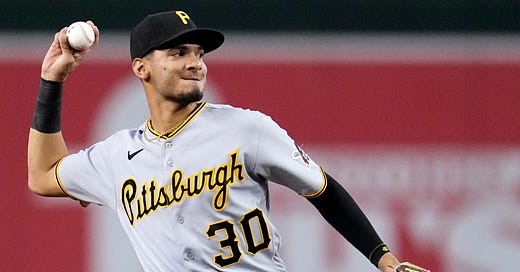Peanuts, crackerjacks and the over-under.
Gambling continues to shape our current sports landscape: baseball, in particular.

For decades now, gambling has been held up as the baseball sin for which all other infractions will be judged - entrenched as the ultimate no-no in the sport since the Black Sox scandal cast its shadow over “honest and true” ball more than a century ago.
Even if, baseball and (to be fair) all sports have seen their history on various fronts shaped by those, now, in 2024, they’d rather not acknowledge too openly, if at all.
Gamblers, cheaters and steroid users. Men of immoral and questionable character. Unrepentant racists, abusers and whomever else.
Baseball has seen its fair share, there is no doubt - and despite personal misgivings on that standard, one way or another, many of them have found themselves enshrined in Cooperstown (unless, of course, you’re Barry Bonds).
After all, what was it Babe Ruth said about Ty Cobb, who was notorious for checking off quite a few of those above boxes?
Oh, that’s right.
Anyway.
However you slice it? Fair or not, on that spectrum, gambling is different in baseball.
Persona non grata.
Bonds, for the record, I still believe, will eventually make his way to the plaque room in Upstate New York - the juice is one thing, sure but hell will freeze thrice over before Joe Jackson or Pete Rose follow suit.
But that hardline has seen itself tested more and more frequently in baseball’s cultural space over the past few years, “Rule 21”, be dammed.
On June 4th, it was announced that Tucupita Marcano, a shortstop under contract with the San Diego Padres, had been banned for life from MLB and its minor league affiliates following revelations that he bet on Pirates games during his time in Pittsburgh (rehabbing from a torn ALC, he hadn’t yet played this season).
Per MLB, by way of the Associated Press, Marcano had placed nearly 400 bets on baseball throughout 2022 and 2023, though he won just 4.3-percent of his MLB-focused wagers. Twenty five of those bets were on the Pirates specifically during the time he was on team’s roster.
In addition to Marcano, four others, who either bet on or were playing in the minors at the time of their alleged gambling have been suspended for one year (Michael Kelly, Jay Groome, Andrew Saalfrank and José Rodríguez).
Marcano however, is the biggest draw, if not through his play necessarily (he played a career-high 75 games last season) but because of the fact that he is the first active baseball player to be penalized in such a way since Jimmy O’Connell one hundred years ago.
And there is a certain ethical and moral understanding, of course.
A line that shouldn’t be crossed, either way.

You don’t want players to compromise their integrity, or that of the game as a whole, through gambling, by say, putting money down on games they’re directly involved in.
But on the other hand, it is to realize that sports betting has become a billion-plus-dollar industry across North America: to expect any and all athletes, baseball players in particular, to keep their noses clean just because the sport overall has a less-than-stellar track record?
C’mon. That’s just being purposely ignorant.
When the NBA, NHL and yes, MLB are all working together, like they were last fall, to develop a “safe betting” advertising rollout for their hard-paying costumers?
At least treat me like an adult, you know? Practice what you preach and whatnot.
And don’t misunderstand - if you want to put down some money on a little action, there is absolutely nothing wrong with that. We’ve all done it every now and then.
But I just can’t shake the hypocrisy, even if, at the end of the day, business is business.
Earlier this spring, the NBA banned Toronto Raptors player Jontay Porter after it came to light that he had been gambling on basketball games, including providing information on his personal health to known betters.
And heck, even Shohei Ohtani of the LA Dodgers, he of global baseball superstardom isn’t immune. A few weeks back, Ohtani found himself caught up in a gambling scandal involving his now-former interpreter and right-hand, Ippei Mizuhara.
Ohtani had already been cleared of any wrongdoing but on Tuesday, June 4th, the hammer came down for Mizuhara: he plead guilty to bank and tax fraud, per AP, having stolen some $17 million from Ohtani in a vain attempt to cover what ballooned to some $41 million in gambling debts - although, if it counts for anything, it seems he never bet on baseball.
Well, there’s one.
There must be a shift though - the major leagues may have embraced the industry but it can’t be a two-sided effort, either. Sticking to their somewhat-antiquated guns but wanting to reward themselves with the resulting profit at the same time.
Is there a solution? Not in the immediate moment, no, I don’t think so. And even if there is?
It won’t be simple.




